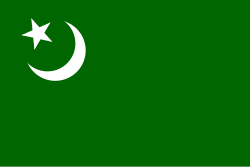Indian Union Muslim League | |
|---|---|
 | |
| Abbreviation | IUML |
| President | K. M. Kader Mohideen |
| Chairman | Sayyid Sadiq Ali Shihab Thangal |
| Secretary | P. K. Kunhalikutty |
| Rajya Sabha Leader | P. V. Abdul Wahab |
| Lok Sabha Leader | E. T. Muhammed Basheer |
| Founder | M. Muhammad Ismail |
| Founded |
|
| Preceded by | AIML |
| Headquarters | Quaid-e-Millath Manzil, No. 36, Maraikayar Lebbai Street, Chennai, Tamil Nadu, India. [1] |
| Student wing | Muslim Students Federation (msf) |
| Youth wing | Muslim Youth League (Youth League) |
| Women's wing | Muslim Women's League |
| Labour wing | Swatantra Thozhilali Union (STU) |
| Peasant's wing | Swathanthra Karshaka Sangam (SKS) |
| Ideology | Islamic democracy [2] Liberal conservatism [3] |
| Political position | Centre-right [2] to right-wing [4] [5] |
| Alliance | UDF (Kerala) SPA (Tamil Nadu) INDIA (national level) |
| Seats in Rajya Sabha | 2 / 245 |
| Seats in Lok Sabha | 3 / 543 |
| Seats in Kerala Legislative Assembly | 15 / 140 |
| Election symbol | |
 | |
| Party flag | |
 | |
| Website | |
| iumlkerala | |
Indian Union Muslim League (abbreviated as the IUML or Muslim League) is a Muslim political party primarily based in Kerala. It is recognised as a State Party in Kerala by the Election Commission of India. [6]
Contents
- History
- Early years
- From the 1960s to the 80s
- With the Congress Party
- In the 1990s
- From the 2000s
- National President of Indian Union Muslim League
- Ideology
- Composition
- Organizational structure
- Kerala Legislative Assembly
- Early years (1957–1979/80)
- With the United Democratic Front (1979/80–present)
- Current members
- Electoral performance
- List of Union Ministers
- Members of Parliament
- Lok Sabha Members
- Rajya Sabha Members
- List of State Cabinet Ministers
- Controversies
- See also
- References
- External links
After the Partition of India, the first Council of the Indian segment of the All-India Muslim League was held on 10 March 1948 at the south Indian city of Madras (now Chennai). [7] The party renamed itself as the 'Indian Union Muslim League' and adopted a new constitution on 1 September 1951. [7]
IUML is a major member of the opposition United Democratic Front, the INC-led pre-poll state level alliance in Kerala. [8] [9] Whenever the United Democratic Front rules in Kerala, the party leaders are chosen as important Cabinet Ministers. The party has always had a constant, albeit small, presence in the Indian Parliament. [8] The party is a part of the INDIA in national level. [8] The League first gained a ministry (Minister of State for External Affairs) in Indian Government in 2004. [10]
The party currently has five members in Parliament – E. T. Mohammed Basheer, M. P. Abdussamad Samadani and Kani K. Navas in the Lok Sabha and P. V. Abdul Wahab and Adv. Haris Beeran [11] in the Rajya Sabha – and fifteen members in Kerala State Legislative Assembly.






